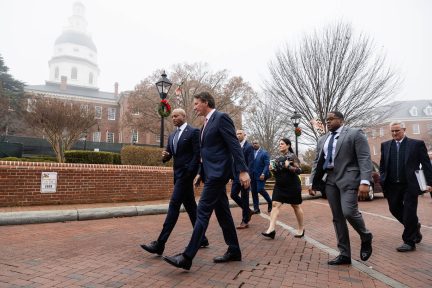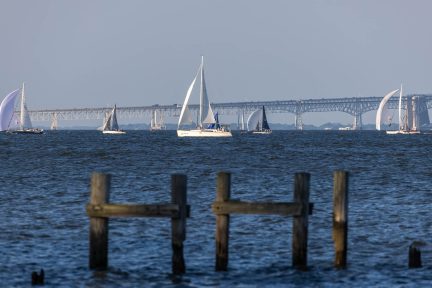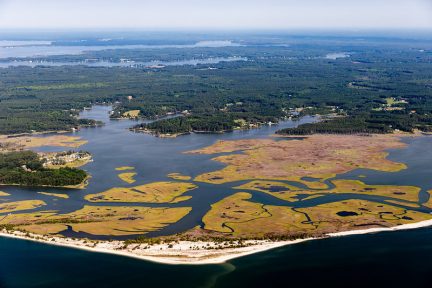NFWF announces more than $13.1 million in grants from the Chesapeake Bay Stewardship Fund
The National Fish and Wildlife Foundation (NFWF) and the U.S. Environmental Protection Agency (EPA) today announced more than $13.1 million in grants to support the restoration and conservation of the Chesapeake Bay watershed in six U.S. states and the District of Columbia.
The National Fish and Wildlife Foundation (NFWF) and the U.S. Environmental Protection Agency (EPA) today announced more than $13.1 million in grants to support the restoration and conservation of the Chesapeake Bay watershed in six U.S. states and the District of Columbia. The 49 grants will generate nearly $21.9 million in matching contributions for a total conservation impact of nearly $35 million.
The grants were awarded through the Chesapeake Bay Stewardship Fund (CBSF), a partnership between NFWF and the EPA’s Innovative Nutrient and Sediment Reduction Grants Program (INSR Program) and Small Watershed Grants Program (SWG Program). Additional support is provided by the U.S. Department of Agriculture’s Natural Resources Conservation Service, the U.S. Forest Service, the U.S. Fish and Wildlife Service, the Altria Group Restoring America’s Resources partnership and CSX.
Grant recipients were announced at the Cork Factory Hotel in downtown Lancaster in conjunction with the NFWF–hosted, biennial Chesapeake Ag Forum, a conference that brings together the best practitioners and partners advancing agricultural conservation practices across the Chesapeake Bay watershed.
“The Commonwealth of Pennsylvania plays a significant role in the health of the Chesapeake Bay watershed,” said Senator Bob Casey. “But more importantly, actions taken in Pennsylvania to improve the Bay begin with efforts to restore clean water to the Conestoga, the Susquehanna, and the thousands of miles of rivers and streams right here in the Commonwealth. Financial resources, beginning with our Federal agency partners like the U.S. Environmental Protection Agency, are critical to these ongoing collaborative local efforts.”
The projects supported by the 49 grants announced today will support methods to improve waterways, restore habitat and strengthen iconic species in Delaware, Maryland, New York, Pennsylvania, Virginia, West Virginia and the District of Columbia. The funds will engage farmers and agricultural producers, homeowners, churches, businesses and municipalities in on-the-ground restoration that supports quality of life in their communities, improving local waterways and, ultimately, the health of the Bay.
“EPA is pleased to support innovative and sustainable approaches to improving the health of our rivers and streams,” said EPA Regional Administrator Cosmo Servidio. “These investments in partnerships with states and local organizations encourage community stewardship of resources that will help preserve and enhance healthy waterways throughout the Chesapeake Bay watershed.”
The INSR Program awarded more than $7.3 million to eight projects, with recipients providing more than $10.4 million in match. The program provides grants to accelerate the implementation of water quality improvements specifically through the collaborative and coordinated efforts of sustainable, regional-scale partnerships with a shared focus on water quality restoration and protection in local waterways and the Chesapeake Bay.
“The grants announced today will empower communities and businesses throughout the Chesapeake Bay watershed to become better stewards of natural resources,” said Jeff Trandahl, executive director and CEO of NFWF. “In many cases, these grants fund voluntary efforts to decrease sedimentation and runoff from farms and businesses, which boosts water quality throughout the 64,000-square-mile watershed and advances long-running efforts to improve the overall health of the Chesapeake Bay.”
The SWG Program awarded more than $5.7 million to 41 projects, with recipients providing nearly $11.4 million in match. The program provides grants to organizations and municipal governments that are working to improve the condition of their local watershed through on-the-ground restoration, habitat conservation and community involvement. Grant recipients expect to reduce pollution through infrastructures including greener landscapes and community outreach initiatives that promote native landscaping and improved practices for managing runoff.
This year’s Chesapeake Bay Stewardship Fund grant recipients include:
- Lancaster Farmland Trust ($198,463) will reduce pollution flowing from Salisbury Township farms to the Chesapeake Bay by catalyzing increased adoption of farm conservation practices through connecting the economic value of conservation to farm resilience and other methods including creating learning farms.
- Capital Resource Conservation and Development Area Council, Inc. ($194,431) will support the adoption of rotational grazing and cover cropping on many livestock farms and work closely with six to 10 farms to support their transition to managed grazing.
- Alliance for the Chesapeake Bay ($1,000,000) will support dairy farmers in meeting their sediment and nutrient reduction needs through a collaborative public-private partnership between the Alliance for the Chesapeake Bay, Turkey Hill Dairy, and the Maryland and Virginia Milk Producers Cooperative Association.
A complete list of the Chesapeake Bay Stewardship Fund 2018 grants winners is available here.
Since 2006, the INSR Program has provided more than $84.7 million to 176 projects that reduce the amount of nitrogen, phosphorus and sediment in the Chesapeake Bay watershed. Since 1999, the SWG Program has provided more than $57 million to support 845 projects in the region to protect and restore the natural resources of the Bay watershed.
For more information about the Chesapeake Bay Stewardship Fund or to download the 2018 Chesapeake Bay Stewardship Fund Grant Slate, visit http://www.nfwf.org/chesapeake.
About the National Fish and Wildlife Foundation
Chartered by Congress in 1984, the National Fish and Wildlife Foundation (NFWF) protects and restores the nation's fish, wildlife, plants and habitats. Working with federal, corporate and individual partners, NFWF has funded more than 4,500 organizations and committed more than $4.8 billion to conservation projects. Learn more at www.nfwf.org.
###



